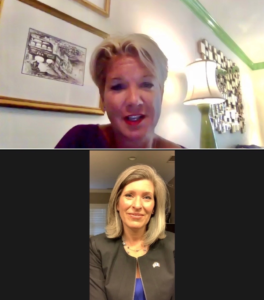FOR IMMEDIATE RELEASE
May 7, 2020
CONTACT:
Olivia Perez-Cubas
[email protected]
Ernst joins W4W Members as this week’s “Modern-Day Rosie”, an initiative recognizing contributions of conservative women during COVID-19
WASHINGTON, DC – U.S. Senator Joni Ernst (R-IA) participated in a new Winning For Women (W4W) initiative on Wednesday that recognizes the leadership and efforts of conservative women during the COVID-19 crisis. Ernst answered questions submitted by W4W members in a live policy discussion moderated by W4W board member Ashley Davis.
Ernst and Davis discussed the impact of COVID-19 on survivors of domestic abuse and sexual assault, the national food supply chain, US-China relations,and more. Watch the full discussion here.
This initiative is a modern-day twist on Rosie the Riveter, an iconic image that first became popular during World War II and served as a symbol of women who stepped up to lead when our country needed them most.Each week, W4W will recognize a new woman as its “Modern-Day Rosie.”

Partial transcripts of the discussion are below:
|
|
Q: Talk about your China bill a little bit. I know the bill works on military families’ retirements not being able to be invested in Chinese companies. Can you talk about that a little?
ERNST: Yes, absolutely. I have got a number of bills that address our ties to China specifically. This one that I am most recently working on – with Senator Marco Rubio of Florida – would prohibit the investment of American military members’ dollars, or other federal agencies – those that were at federal agencies, as they contribute into their various savings apparatuses – that those dollars could not be invested in Chinese interests. This is really, really important. So we have a mirror bill over in the House that Mike Waltz from Florida has sponsored. And we really want to make sure that we aren’t pumping up the Chinese.
We would love to see those dollars – it’s American military dollars – and the Chinese are near peer adversaries to us when it comes to national defense. So it doesn’t make sense that we are pumping money into the Communist Party of China. Makes no sense at all. So our bill would prohibit that.
I do have a number of other bills as well that address funding to the Wuhan lab. Funding that has gone to the Chinese wet markets, where we suspect some of these viruses really gain a foothold. So we really need to pay attention to where our American taxpayer dollars are going. And certainly, if we’re investing in an allied country, wonderful. If we are working with a friendly country, wonderful. China is neither. So we really need to stop these practices and I am proud to be a sponsor on those bills.
Q: How are we addressing the problems of food supplies in the US?
ERNST: I think we have a heightened awareness in the United States right now of our food supply chain, and where our food actually comes from.…
Of course, with our meat packing facilities, we need to get those back up and running. So President Trump did an Executive Order not all that long ago that instituted the Defense Production Act, bringing those plants back up online. But it ties back into the first question, though, that it’s great to open those plants, but if you don’t have a labor pool to draw from then we can’t get those plants operating at full capacity to get the meat out there on to the grocery store shelves. So we are working very carefully with the Governor. We are working with a number of our federal agencies like OSHA and CDC to make sure that the proper protections are put in place at those meat processing facilities – that they are doing testing, that we have the proper PPE, the personal protective equipment, for those workers so that they can get back to their jobs. And as soon as we can do that we will be operating once again.
I think it’s really great that people are really focused on their food right now. We have not seen anything like this in recent history, where we see stores that are rationing meat now, you know. I know we had the rationing of toilet paper, but this is something entirely different. And you really set people into a panic if they believe that we won’t have access to food sources for our families. And so I think that’s another step in the right direction, if we can get these plants up and going so we don’t see stores saying you can only buy four packages of meat, or so forth.
But we are working closely with our Governor, the federal agencies, to make sure that we’re supporting our food industry across the board.
###
ABOUT WINNING FOR WOMEN:Winning For Women is a 501(c)(4) organization that aims (1) to inform the public of national security and free-market policy that will benefit the lives of all Americans, (2) to organize and amplify the voices of women across the country who embrace such, broadening the audience for a strong conservative message, and (3) to expand the ability of right-of-center women to succeed in their pursuit of leadership opportunities, including elected office. WFW works closely with its advisory team of high-profile leaders and supporters.Its Board of Directors includes former U.S. Senator Kelly Ayotte, former U.S. Representative Barbara Comstock, founding partner at West Front Strategies Ashley Davis, W4W Board Member Jenny Singer, Hudson Institute Chairman Sarah May Stern, and W4W Board Member Rebecca Schuller.
